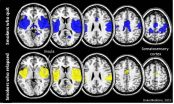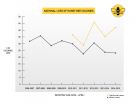INFORMATION:
In addition to Bernstein, the study authors included: Dr. Richard Saitz, chair and professor of community health sciences at BUSPH; Debbie M. Chang, professor of biostatistics at BUSPH; Dr. Jeffrey Samet, professor of medicine at the BU School of Medicine and chief of general internal medicine at Boston Medical Center; Na Wang, statistical analyst at the BUSPH Data Coordinating Center; and Caitlin Trilla, formerly a research assistant at Boston Medical Center.
Recreational drug use on weekends often morphs into daily use, BU study finds
2015-05-13
(Press-News.org) More than half of patients who report "weekend-only" drug use end up expanding their drug use to weekdays, too -- suggesting that primary care clinicians should monitor patients who acknowledge "recreational" drug use, says a new study by Boston University public health and medicine researchers.
The study, published in the journal Annals of Family Medicine and led by Judith Bernstein, professor of community health sciences at the BU School of Public Health (BUSPH), recommends that clinicians use "caution in accepting recreational drug use as reassuring," and that they conduct "continued episodic monitoring" of patients who report weekend-only drug use.
The study followed 483 patients at Boston Medical Center who reported using drugs in the previous month and who completed a follow-up visit six months later. Of those who reported weekend-only use initially, only 19.2 percent retained that pattern six months later, while 54 percent were using drugs on other days of the week. Drugs most commonly used included marijuana, cocaine and opioids.
"These findings suggest the importance of periodic monitoring of 'recreational' drug use," the study says. "A single-question standardized screen can be used to elicit necessary information."
Bernstein said the findings indicate that weekend-only use "frequently progresses into daily use, and warrants continued monitoring" by clinicians.
"The real message of this paper is a monitoring message," she said. Primary care providers "are in a position to support positive behavioral change, as well as to address increases in drug-use intensity as an integral part of their role."
The study notes that weekend-only users had lower odds of increasing drug-use frequency and severity than people whose drug use was not limited to weekends. Also, the study participants were inner-city residents with recent drug use, meaning the findings might not be generalizable to the population as a whole, the authors noted.
Illegal drug use among primary care patients is estimated at five to eight percent, but often goes undetected. Any drug use, even occasional, may have an impact on disease processes and the effectiveness of prescribed medication, the authors said.
ELSE PRESS RELEASES FROM THIS DATE:
Astrology and celebrity: Seasons really do influence personality
2015-05-13
People's personalities tend to vary somewhat depending on the season in which they are born, and astrological signs may have developed as a useful system for remembering these patterns, according to an analysis by UConn researcher Mark Hamilton. Such seasonal effects may not be clear in individuals, but can be discerned through averaging personality traits across large cohorts born at the same time of year. Hamilton's analysis will be published in Comprehensive Psychology on 13 May.
Psychologists have known that certain personality traits tend to be associated with certain ...
Nano-policing pollution
2015-05-13
This news release is available in Japanese.
Pollutants emitted by factories and car exhausts affect humans who breathe in these harmful gases and also aggravate climate change up in the atmosphere. Being able to detect such emissions is a critically needed measure.
New research by the Nanoparticles by Design Unit at the Okinawa Institute of Science and Technology Graduate University (OIST), in collaboration with the Materials Center Leoben Austria and the Austrian Centre for Electron Microscopy and Nanoanalysis has developed an efficient way to improve methods ...
No link found between PTSD and cancer risk
2015-05-13
(Boston)--In the largest study to date that examines Post Traumatic Stress Disorder (PTSD) as a risk factor for cancer, researchers from Boston University School of Medicine (BUSM), have shown no evidence of an association.
The study, which appears in the European Journal of Epidemiology, is consistent with other population-based studies that report stressful life events generally are not associated with cancer incidence. In addition to corroborating results of other studies, this large population sample allowed for important stratified analyses that showed no strong ...
Potential obesity treatment targets the 2 sides of appetite: Hunger and feeling full
2015-05-13
Our bodies' hormones work together to tell us when to eat and when to stop. But for many people who are obese, this system is off-balance. Now scientists have designed a hormone-like compound to suppress hunger and boost satiety, or a full feeling, at the same time. They report in ACS' Journal of Medicinal Chemistry that obese mice given the compound for 14 days had a tendency to eat less than the other groups.
In their study, Constance Chollet and colleagues targeted two main receptors in the body that help keep appetite in check. When hormones bind to ghrelin receptors, ...
Caution urged in using measures of students' 'non-cognitive' skills for teacher evaluation, school accountability, or student diagnosis
2015-05-13
WASHINGTON, D.C., May 13, 2015--Policymakers and practitioners have grown increasingly interested in measures of personal qualities other than cognitive ability--including self-control, grit, growth mindset, gratitude, purpose, emotional intelligence, and other beneficial personal qualities--that lead to student success. However, they need to move cautiously before using existing measures to evaluate educators, programs, and policies, or diagnosing children as having "non-cognitive" deficits, according to a review by Angela L. Duckworth and David Scott Yeager published ...
How used coffee grounds could make some food more healthful
2015-05-13
Coffee has gone from dietary foe to friend in recent years, partly due to the revelation that it's rich in antioxidants. Now even spent coffee-grounds are gaining attention for being chock-full of these compounds, which have potential health benefits. In ACS' Journal of Agricultural and Food Chemistry, researchers explain how to extract antioxidants from the grounds. They then determined just how concentrated the antioxidants are.
María-Paz de Peña and colleagues note that coffee -- one of the most popular drinks in the world -- is a rich source of a group ...
Disposable wipes are costing sewage systems millions of dollars
2015-05-13
Several class-action lawsuits filed recently against the makers of flushable wet-wipes have brought to light a serious -- and unsavory -- problem: The popular cleaning products might be clogging sewer systems. But whether the manufacturers should be held accountable is still up in the air, according to an article in Chemical & Engineering News (C&EN), the weekly newsmagazine of the American Chemical Society.
Jessica Morrison, assistant editor at C&EN, reports that New York City alone claims to have spent more than $18 million over six years clearing wipes from its wastewater ...
A helping paw for a sinking rat
2015-05-13
Rats have more heart than you might think. When one is drowning, another will put out a helping paw to rescue its mate. This is especially true for rats that previously had a watery near-death experience, says Nobuya Sato and colleagues of the Kwansei Gakuin University in Japan. Their findings are published in Springer's journal Animal Cognition.
Recent research has shown that a rat will help members of its own species to escape from a tubelike cage. The helping rat will show such prosocial behavior even if it does not gain any advantage from it. To see whether these ...
Brains of smokers who quit successfully might be wired for success
2015-05-13
DURHAM, N.C. - Smokers who are able to quit might actually be hard-wired for success, according to a study from Duke Medicine.
The study, published in Neuropsychopharmacology, showed greater connectivity among certain brain regions in people who successfully quit smoking compared to those who tried and failed.
The researchers analyzed MRI scans of 85 people taken one month before they attempted to quit. All participants stopped smoking and the researchers tracked their progress for 10 weeks. Forty-one participants relapsed. Looking back at the brain scans of the 44 ...
Nation's beekeepers lost 40 percent of bees in 2014-15
2015-05-13
Beekeepers across the United States lost more than 40 percent of their honey bee colonies during the year spanning April 2014 to April 2015, according to the latest results of an annual nationwide survey. While winter loss rates improved slightly compared to last year, summer losses--and consequently, total annual losses--were more severe. Commercial beekeepers were hit particularly hard by the high rate of summer losses, which outstripped winter losses for the first time in five years, stoking concerns over the long-term trend of poor health in honey bee colonies.
The ...



